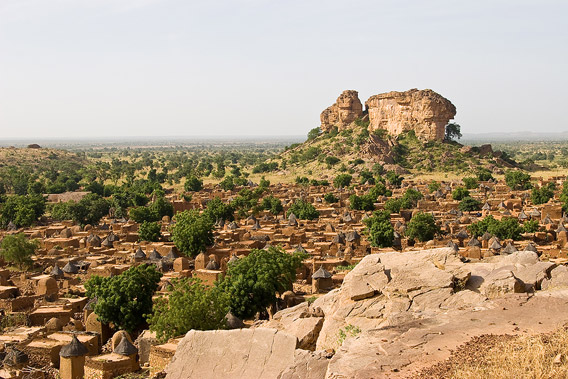
Dogon village Songo in Mali, Africa
. The Dogon are an ethnic tribe in the Sahel. Photo by: Bigstock.
The UN announced yesterday that food security in the Sahel region is deteriorating, putting over 15 million people at risk. Ongoing drought combined with conflict, has pushed the region into a crisis. The situation appears eerily similar to last year when Somalia was hit by a devastating famine due to drought and political instability; the famine left an estimated 30,000 children dead.
“This is already an appalling crisis in terms of the scale and degree of human suffering and it will get worse unless the response plans are properly funded,” John Ging, Director of Operations at the UN Office for the Coordination of Humanitarian Affairs (OCHA), said in a press release. “It’s a matter of life or death for millions who are on the brink.”
Instability in Nigeria and Syria have exacerbated the situation, while a military coup in Mali has pushed between 100,000-200,000 refugees into neighboring countries. Sahel nations, such as Mali, Niger, Chad, Burkina Faso, Mauritania, Senegal, Cameroon, Gambia, Nigeria and South Sudan, the world’s newest nation, are all seen as vulnerable.
Response programs to the food crisis are currently underfunded by over 60 percent according to the OCHA, even as a report released in January found that a delayed response to Somalia crisis cost thousands of lives.
“We all bear responsibility for this dangerous delay that cost lives in East Africa and need to learn the lessons of the late response,” Oxfam’s Chief Executive, Barbara Stocking, candidly stated in a press release on the report. “It’s shocking that the poorest people are still bearing the brunt of a failure to respond swiftly and decisively. We know that acting early saves lives but collective risk aversion meant aid agencies were reluctant to spend money until they were certain there was a crisis.”
Drought is a regular occurrence in the Sahel and communities have long-adapted to dry conditions, however some scientists say recent droughts may be worsening due to climate change.
Related articles
Another food crisis looming in Africa: nearly 5 million South Sudanese lacking food
(02/08/2012) The Food and Agriculture Organization (FAO) and the World Food Program (WFP) have warned that South Sudan is facing a food crisis and that immediate action is needed to stave off a disaster. Currently 4.7 million people do not have enough to eat in South Sudan, while one million of these face severe food shortages. That number, however, could double if on-going conflict in the region continues and food prices continue rising, says the UN agencies.
Delayed response to Somalia famine cost thousands of lives
(01/18/2012) A hesitant response by the international community likely led to thousands of unnecessary deaths in last year’s famine in East Africa finds a new report released by Oxfam and Save the Children. The report, entitled A Dangerous Delay, says that early warning systems worked in informing the international community about the likelihood of a dire food crisis in East Africa, however a “culture of risk aversion” led to months-long delays. By the time aid arrived it was already too late for many. The British government has estimated somewhere between 50,000 and 100,000 people perished in the famine, half of whom were likely children under five.
Global food prices set record in 2011
(01/16/2012) Last year saw the highest average food prices since recording began in 1990, according to the Food and Agriculture Organization’s (FAO) Food Price Index. The Food Price Index’s average for the year was 228 points, 28 points higher than the past record set in 2008.